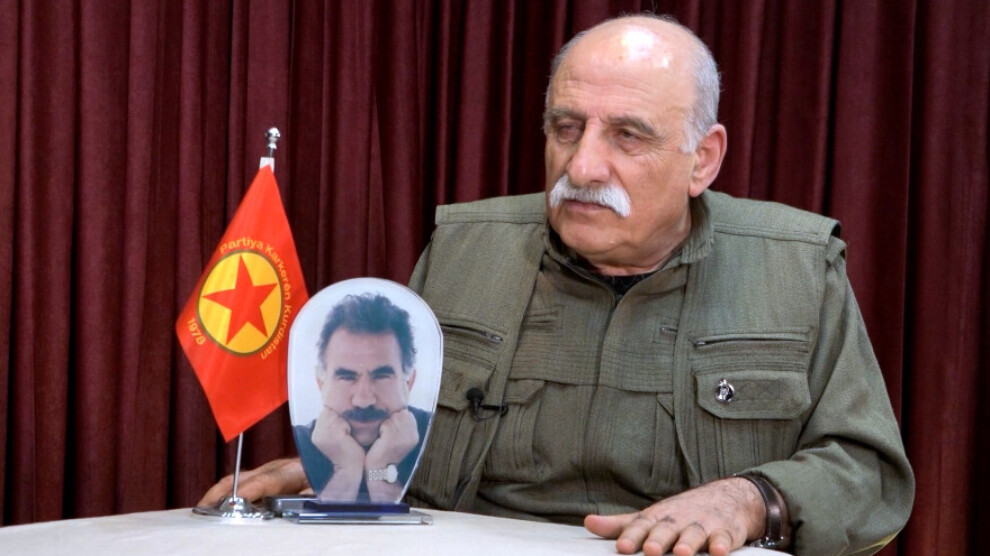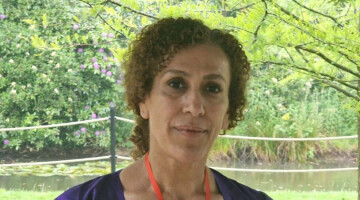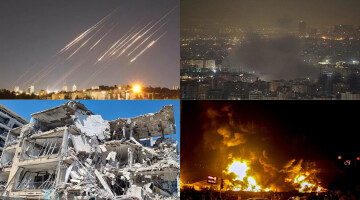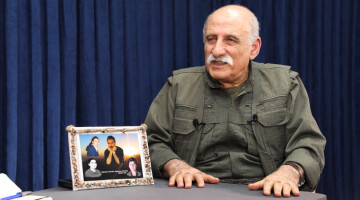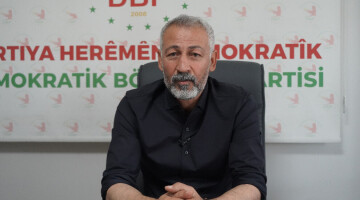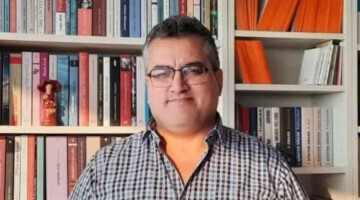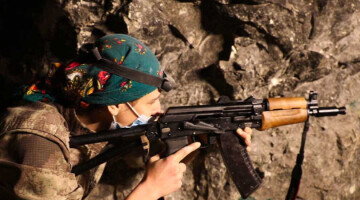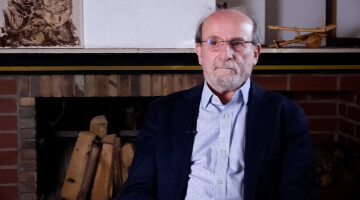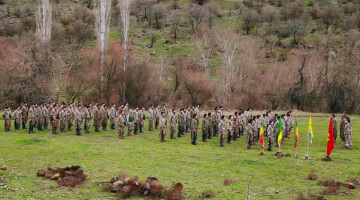In the third part of this in-depth interview, Duran Kalkan, member of the KCK Executive Council, said that "if Turkey does not solve the Kurdish question and democratize itself, it will either fight against Israel, come into conflict with the forces behind it, or surrender to them altogether."
Part one of the interview can be read here and part two here.
There are crucial developments in the region that will have an impact on both the Kurds and Turkey as the region takes on a new design. What will be the role of the Kurds and Turkey in this new design?
This is a very broad and significant topic. The fact that the government is doing everything for its own benefit and that the opposition is unable to effectively put forward a mentality and politics that go beyond that actually expresses a situation that clogs Turkey and brings it face-to-face with dangers in such a critical period. This is what is dangerous. Everything is in plain sight. Look at the point of the Third World War. Trump came to power; he had been talking about trade wars, and so he started a war. He is pursuing something with China, he has a system of relations with Russia, he is negotiating with Iran, and he is in talks with everyone at different levels. Israel expanded in the course of its war after the attack on October 7, 2023, and Syria has become the main area of contention and conflict. That this situation has come to Syria is because it has reached Turkey’s borders. We had warned before, “It is Turkey’s turn.” Now, the situation in Cyprus is obvious. There is the restructuring of the Middle East around the new energy route that stretches from India to Greece and passes through the Eastern Mediterranean. The system created in the course of the First World War is now disintegrating. The nation state status quo is being overcome; the nation state system itself is being overcome. It has been defeated in the Arab world, there is some kind of struggle with Iran, and they are also holding talks. In this system, those who carry out these attacks are trying to find a solution in Iran as well. This is the system that Turkey is a part of. They want Turkey to accept a Middle East under Israeli hegemony, to surrender to it.
As we had pointed out in the past, there are only two ways for Turkey within this system: either to fight or to surrender. Apart from this, the third path, the path proposed by Rêber Apo [Abdullah Öcalan], is the path of democratization of Turkey based on Kurdish freedom. This path unites Turkey and reveals its democratic power. This path will make Turkey a pioneer in the Middle East, a model country. It gathers the peoples of the Middle East and the Islamic world around it. Therefore, this would bring about a democratic solution that overcomes the state status quo and develops the alternative of democratic modernity.
Now, supposedly Rêber Apo has been approached and called upon. They wanted the solution to be led by Rêber Apo, but there is no serious, consistent mentality and political approach that meets all these requirements. It is based on narrow, practical political interests. It is like a kind of cheating. They think that they can be successful by developing relations according solely to themselves, not in the way envisioned by Rêber Apo. So they got stuck. They are holding talks on all sides. They are trying to see if they can take advantage of the opportunity and liquidate the PKK, or if not, threaten it or make a deal with Israel. We are aware of these developments and agreements.
There is no need to drag it out. As we said, the struggle has reached a fundamental point in the Middle East, particularly in Iran and Turkey, and in the center of this is Kurdistan, the Kurds. The struggle for the restructuring of the region has reached this point. This situation affects everyone. It affects the Kurds, it affects Turkey, Iran, and all the peoples living in it. The old order was not good for the Kurds. They were divided, fragmented, and killed for over a hundred years. Now, at least this conflicted environment creates new exit possibilities and opportunities. There are dangers and threats of massacres. It is not that we do not see and understand these. But the way forward for the Kurds is more open. Because the genocidal mentality and system that ignores and wants to destroy the Kurds is being broken down and overcome. Even if it is not overcome democratically, this system is disintegrating. If they act wisely in unity, if Kurds struggle well, they can make an effective and positive exit.
If Turkey does not solve the Kurdish question and democratize itself, it will either fight against Israel, come into conflict with the forces behind it, or surrender to them altogether. It will become a second-class or third-class power in the region. There is no other way. This has been imposed. The fight over Syria is a fight for this. Israel is trying to convince the US to intervene, since there will be a clash if they don’t.
Those who govern Turkey, those who love Turkey, its politicians, intellectuals, women, and young people should see this reality. We really wonder why this is not seen. Can’t this society see where its future lies? Can’t it draw a rational conclusion regarding its future for itself? This is where one really laments. It is obvious how important the situation is, how dangerous it is. But there is no such development in society.
The current ruling circles have used all kinds of tricks in the past. It was always said that there had been many games in the Ottoman Empire, but now In the Turkish Republic, the games have doubled the Ottoman Empire. What are they doing against the peoples? What have they done against the Kurds? What did they say in 1918? What did they say in 1919? What did they do in 1920, 1922, and after 1924? What kind of brutal, genocidal attacks and massacres have they carried out on the Kurds? We remember these. We know what has happened in the past century.
There are those who are trying to say that the PKK has been forced, that it has been defeated, that it is taking these steps because it is in a difficult situation, and so on. They are wrong; there is no such thing. If the PKK dissolves itself today, if there is no democratic development, there will be organizations that fight harder than the PKK. Kurdish society has become conscious, organized, and seen how to fight. It will develop all kinds of democratic organizations. It will have difficulties, but not more difficulties than it is experiencing now. There are some saying, “The PKK does not exist anymore”, “The PKK has been defeated,” and “They will surrender”. So why are you still spinning your wheels, complaining about the PKK, trying to form alliances against the PKK? You open your mouth and spew obscenities against the PKK. Are you fighting against something that doesn’t exist, as if you were fighting windmills? You need to be serious; you need to be consistent. Those who think so are mistaken. It is not the PKK that got stuck in a deadlock. The Kurds have fought a great war, resisted, paid a high price, and faced countless difficulties, but they also have gained the power to overcome them. They have learned to fight and win in the face of even the harshest difficulties.
It is necessary to struggle actively, effectively, and united against these distracting approaches that drown the situation in narrow power conflicts, and therefore against approaches that disregard, hinder, sabotage, and provoke the solution based on Kurdish freedom and the democratization of Turkey. Otherwise, Turkey itself will face the greatest danger. I suggest that those who love Turkey should come to the point, see the reality, and protect their future.
In your opinion, given the current situation you describe, what should be the convergence of the socialist forces and the democratic forces of society?
What we have to say to the socialist forces and the democratic forces of society is important. Rêber Apo defined the process by the ‘Call for Peace and Democratic Society’. Peace means the reconciliation of two sides. It involves ending the conflicts and moving from the position of rejecting and wanting to destroy each other to the position of reconciling and wanting to get along. But what is essential for this is a democratic society to develop. Only it can develop this process and guarantee peace.
The forces striving for freedom and democracy, the forces of democratic society in general, must know what it takes to exist freely and to have their own free political will. Rêber Apo’s call was to everyone. It was addressed to the government, to the opposition, to all the political forces of the world, but mostly to the democratic forces of society in Kurdistan and Turkey. Women, youth, workers and laborers, intellectuals, and artists, and democratic and socialist forces, these are the forces that will pave the way for Kurdish freedom and the democratization of Turkey. These are the forces that will guarantee freedom and democracy. These forces are the interlocutors of the process, the main addressees of the call. They should stop criticizing others by saying things like, “What is the AKP doing?”, “What is the CHP doing?” or “Why aren’t they doing this or that?” Looking at others means expecting something from them. Do they expect something from the ruling forces, or do democratic society and socialist forces expect something from themselves? They should expect it from themselves. These socialist, democratic forces, ecologists, and women’s liberationist forces should understand this process better and embrace it more.
Kurdish society, particularly the women and the youth, should be much more careful and sensitive. And so should be the democratic circles. There is a fierce special warfare going on. They are creating a soft perception, trying to make the process look wrong. We need to be vigilant; we need to be careful. It is not as easy as it is stated. There is a fierce struggle, a very intense, complex situation. No one is going to give us anything for free. We need to be vigilant and win through struggle. We have entered a period in which more struggle, more multifaceted struggle, is needed in order to achieve big successes. It is possible to be successful, but for this we need to organize and struggle; we need to do it with our own willpower. It cannot be done by hanging on the tail of others; it cannot be done by waiting for others. Therefore, both the Kurdish society and all democratic forces in Turkey, antifascist, democratic, freedom-striving forces must come together and unite. The third path is the alternative of democratic society. In order to develop this, they must create unity among themselves. It is necessary to create its own thought, program, and organization, and on this basis emerge as an alternative power.
There are demonstrations, but they are limited. As Rêber Apo said, we need to go from person to person, house to house, village to village, and neighborhood to neighborhood. This is Rêber Apo’s call. His call and criticism to the youth was also on this basis. He told them that it is all about organization. This applies to all democratic forces. These activities are to pave the way and create the ground for a democratization. There is still disorganization, narrowness, and wrong expectations; there are expectations from the ruling circles. This is wrong. It is necessary to overcome this. I want to underline this in particular. No one will give anything to them for free, neither to the Kurds nor to the democratic forces of Turkey. On the contrary, they will try to suffocate them. Everyone will look after their own interests; they will regress more, oppress more, and exploit more if they get the opportunity. Nothing can be expected from them. Indeed, all democratic forces of Turkey, the Kurdish society, and all parts of the democratic society are the primary addressees of this call. They are responsible for fulfilling the requirements of this call. They must organize, organize, and again organize to form a strong power. They must organize on the basis of democratic action, they must struggle more, and they must assert their own will. On this basis, I call on these circles to try more intensely to understand the process correctly, to develop more voluntary, democratic unions and freedom and democracy blocs, and to be the creators and guarantors of the success of the process.
At the end of our conversation, I would like to ask one final question. A multi-part documentary on the history of the PKK has begun to be published, and it looks like it has been very well received. Is there anything you would like to add in this regard?
So far two parts of the documentary on the struggle of the PKK, its history, and the reality and truth of Rêber Apo have been published. It is attracting great attention and is an important and instructive work. It is also important for the process; it is not disconnected from it. Everyone is discussing Rêber Apo and the PKK. So the documentary has an important position, effort, and content in explaining and expressing what the PKK is and what the reality of Rêber Apo constitutes. Therefore, it is better to see and understand the truth in its own reality and to oppose or support it accordingly instead of saying positive or negative things based on rote, hearsay approaches.
It is an important, comprehensive, and historical work. It was stated that most of the documents of the PKK struggle will be published. This arouses a lot of interest. And so we found it meaningful for the process.
We congratulate and salute those who made the effort for this documentary. We express our belief that they will carry out similar works more successfully. I invite all our people, especially the youth, our international friends, and all those who are interested in the PKK to watch this documentary with interest as they try to understand the reality of the PKK and Rêber Apo on the basis of Rêber Apo’s analyses and prison writings.

